In today's digital age, ensuring cyber law compliance is more crucial than ever for businesses and individuals alike. With constantly evolving regulations, it can feel overwhelming to navigate the legal landscape, but understanding the essentials can empower you to protect your information effectively. Whether you're a small business owner or an IT professional, grasping these principles will help safeguard you against potential risks and penalties. Curious to learn more about the steps to achieve compliance? Let's dive in!
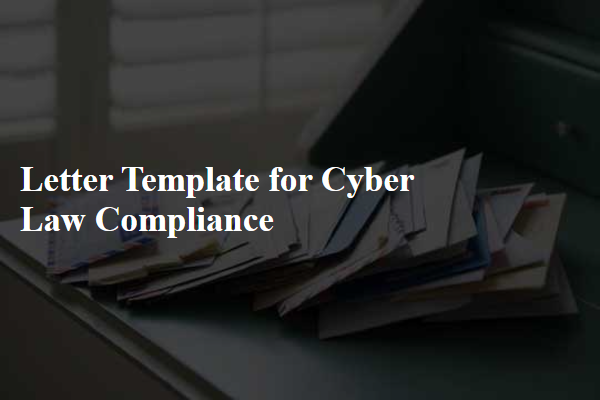
Legal Compliance and Regulatory Framework
Legal compliance in the realm of cyber law encompasses the adherence to various regulations designed to protect data integrity, user privacy, and promote secure online practices. In the United States, the Health Insurance Portability and Accountability Act (HIPAA) mandates strict guidelines for safeguarding sensitive health information, imposing hefty fines for non-compliance which can reach up to $1.5 million annually. The General Data Protection Regulation (GDPR) in the European Union sets a high standard for data protection, impacting businesses globally with fines of up to 4% of annual revenue or EUR20 million, whichever is greater, for violations. Compliance frameworks often include policies regarding the storage, processing, and transfer of personal data, demanding regular audits and assessments to ensure adherence to these legal demands. Organizations must also navigate sector-specific regulations (such as the Payment Card Industry Data Security Standard, PCI DSS, for financial institutions) while maintaining employee training programs to instill a culture of cyber awareness. The framework further necessitates reporting breaches within specific timeframes, such as the 72-hour window stipulated by the GDPR, highlighting the importance of prompt response strategies in maintaining legal compliance.
Data Protection and Privacy Policies
Cyber law compliance requires clear Data Protection and Privacy Policies to safeguard personal information. The General Data Protection Regulation (GDPR) outlines strict guidelines for organizations operating within the European Union, emphasizing the importance of user consent and data transparency. Personal data, defined as any information relating to an identifiable person, must be collected, processed, and stored with explicit consent from the data subject. Organizations must implement robust security measures, such as encryption and access controls, to prevent unauthorized access or breaches. Privacy policies should clearly articulate data collection purposes, retention periods, and user rights, including the right to access and delete personal information, ensuring compliance with both GDPR and local data protection laws across jurisdictions. Regular training and audits are essential to maintain adherence to these regulations and foster a culture of privacy within the organization.
Incident Response and Reporting Procedures
Incident response and reporting procedures establish critical protocols for organizations facing cybersecurity breaches. Clear guidelines outline the steps to take immediately after a data breach, such as unauthorized access to sensitive information, which may affect personal data of customers or employees. The response team, typically comprising cybersecurity experts, legal advisors, and public relations staff, must evaluate the scope of the incident (including potential data loss or damage). Timely reporting to relevant authorities, such as the Federal Trade Commission (FTC) in the United States, is necessary, particularly within specified time frames, such as 72 hours post-incident under GDPR regulations. Documentation of the incident, including a detailed timeline and analysis of the incident response, is essential for future compliance audits. Training employees on these procedures ensures everyone understands their role in maintaining data integrity and security.
Employee Training and Awareness Programs
Employee training and awareness programs on cyber law compliance are essential for organizations aiming to safeguard sensitive data and adhere to legal regulations. These programs must cover pivotal topics such as the General Data Protection Regulation (GDPR) established in the European Union, which governs data privacy and protection for individuals, as well as the Health Insurance Portability and Accountability Act (HIPAA) in the United States, which sets standards for the protection of health information. Employees should also be educated on the consequences of cyber breaches, including potential fines up to 4% of global revenue under GDPR and the impact on public trust. Interactive workshops and regular assessments can reinforce knowledge retention while ensuring that employees understand the importance of adhering to compliance policies and best practices to mitigate risks associated with cyber threats and data breaches.
Regular Audit and Monitoring Systems
Regular audit and monitoring systems are crucial for ensuring compliance with cyber laws, such as the General Data Protection Regulation (GDPR) in the European Union. Organizations must implement continuous assessments of their cybersecurity protocols to evaluate data protection strategies and identify vulnerabilities. These audits should occur at least quarterly and involve checking access controls, data encryption standards, and incident response plans. Additionally, employing monitoring tools enables real-time detection of potential breaches, allowing swift incident response. Adopting comprehensive documentation practices is essential for demonstrating compliance during external assessments or investigations conducted by regulatory bodies, such as the Federal Trade Commission (FTC) in the United States.
Letter Template For Cyber Law Compliance Samples
Letter template of employee training notification for cyber law compliance.
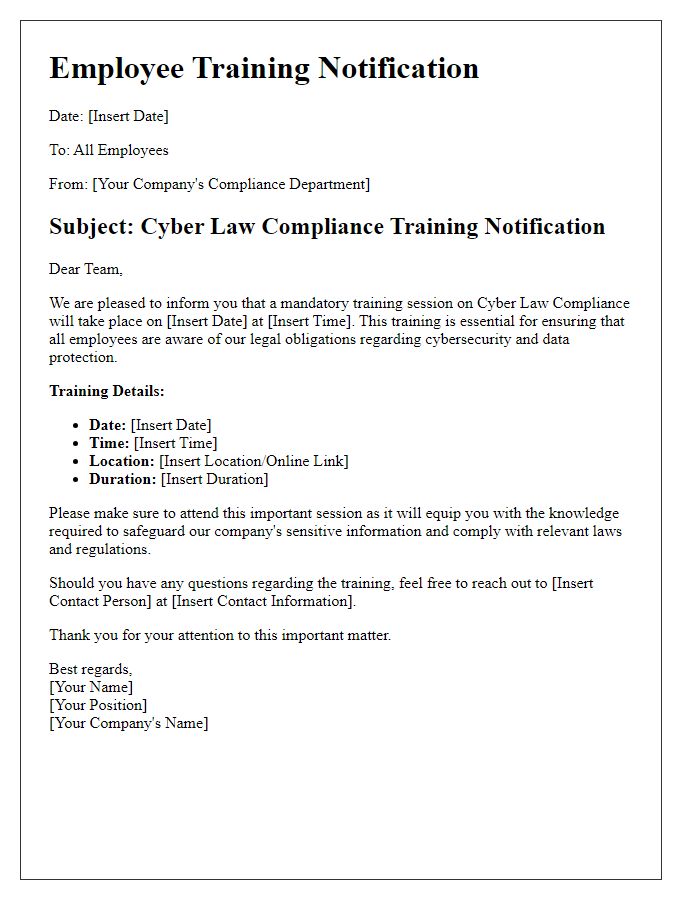

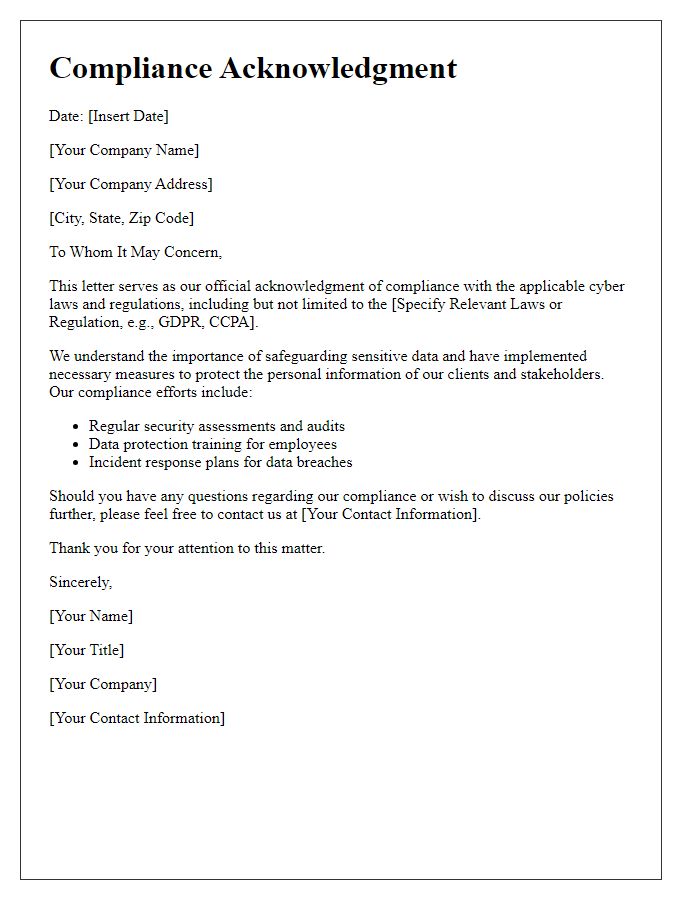
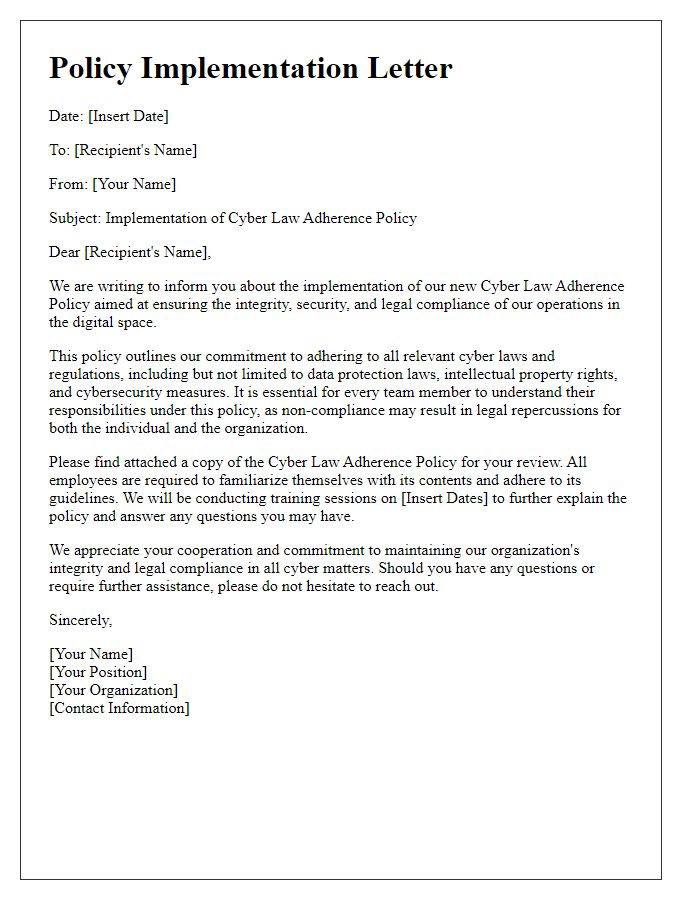
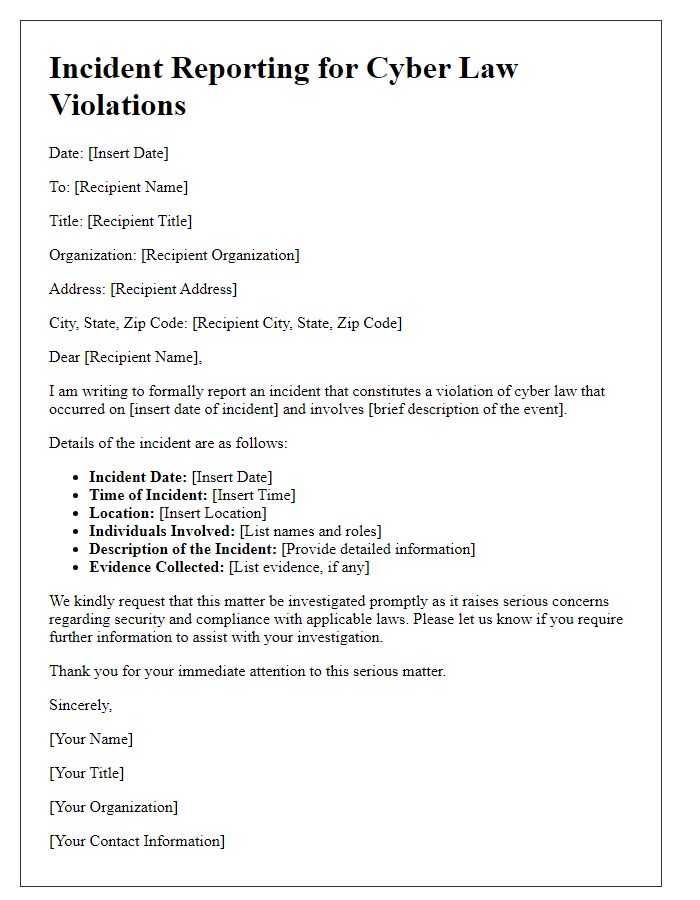
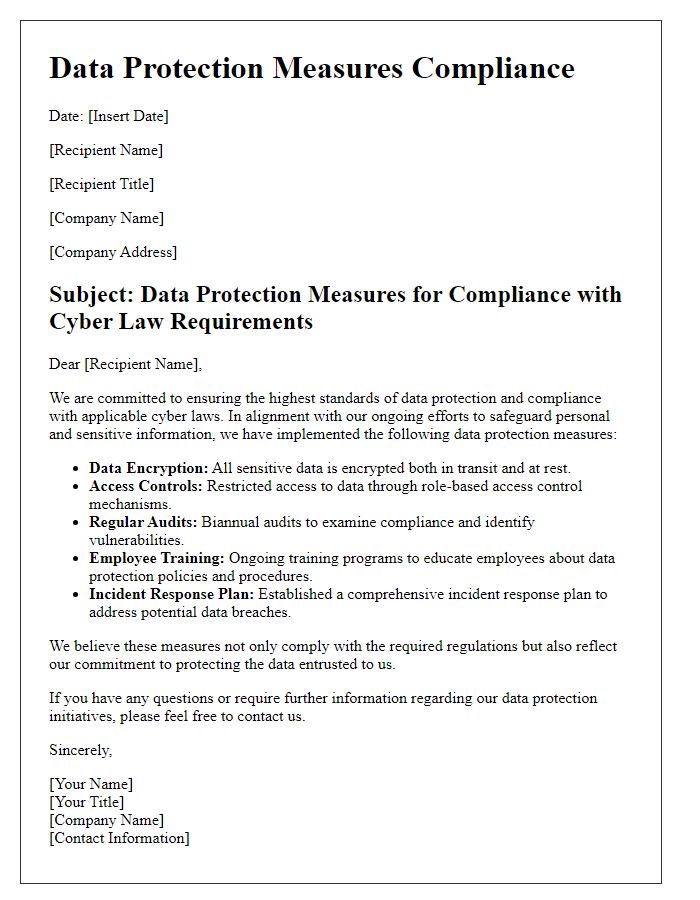
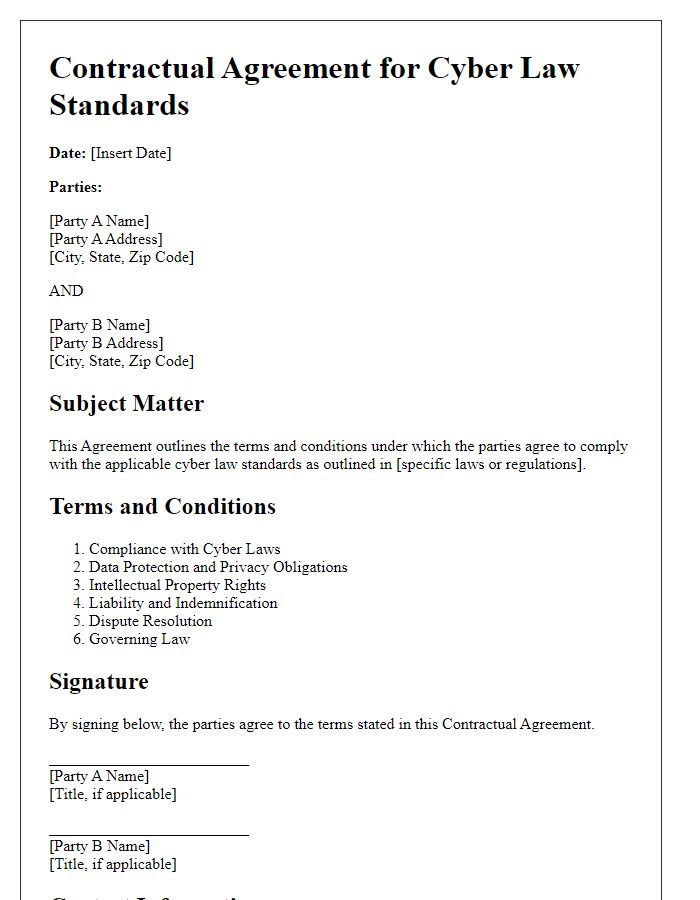
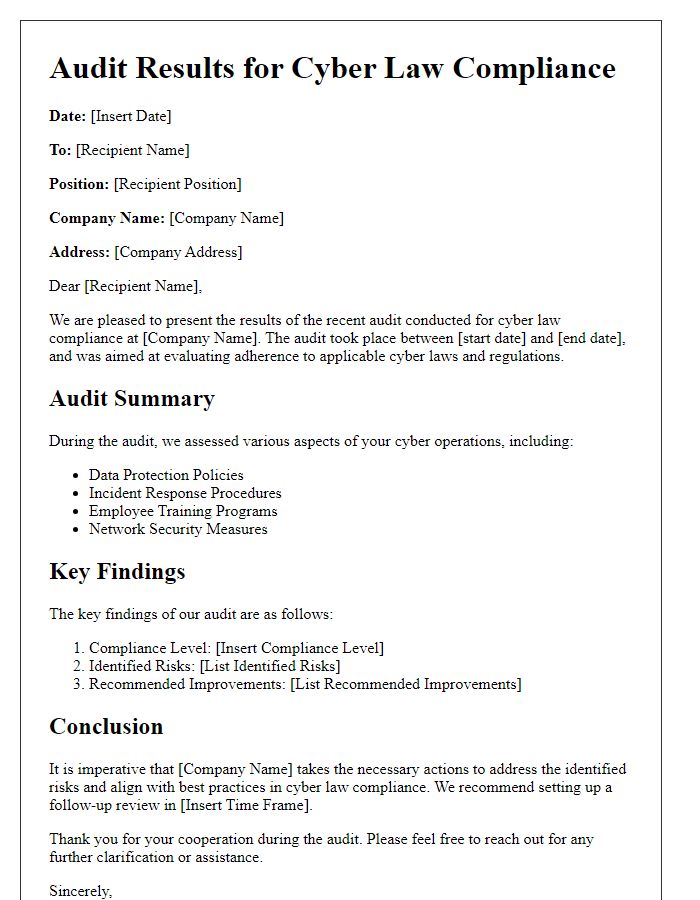
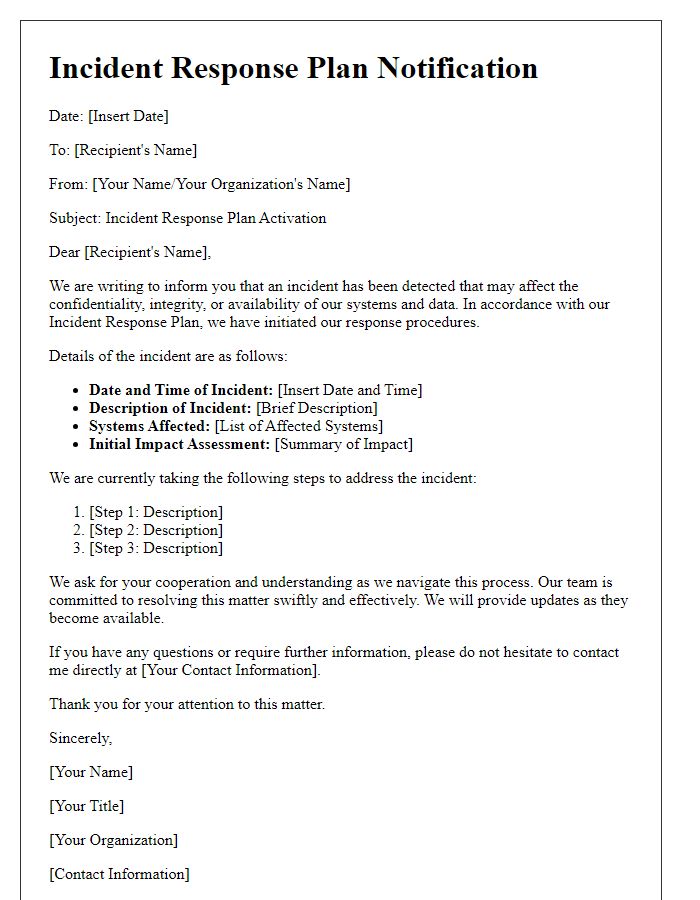
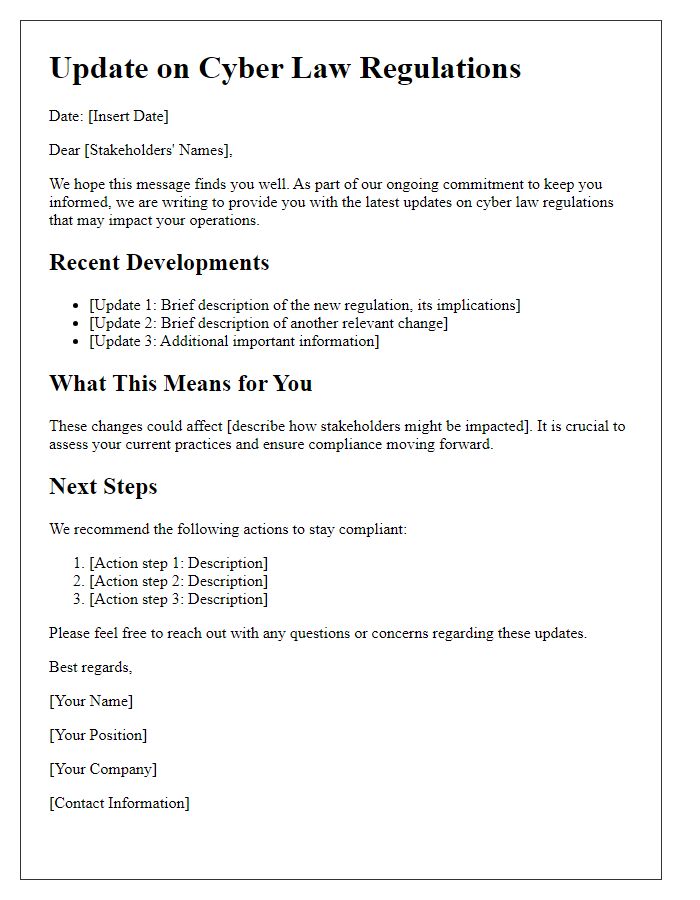



Comments